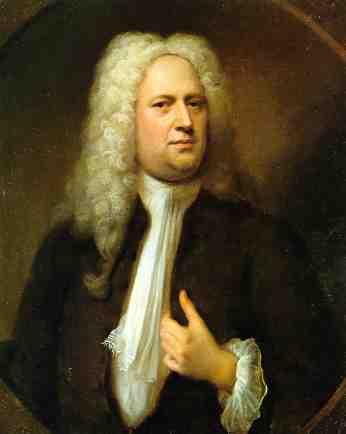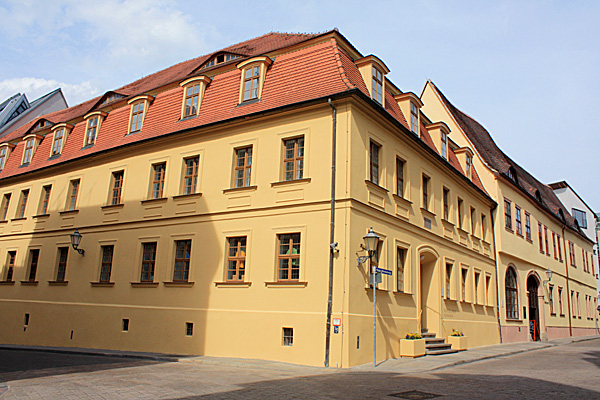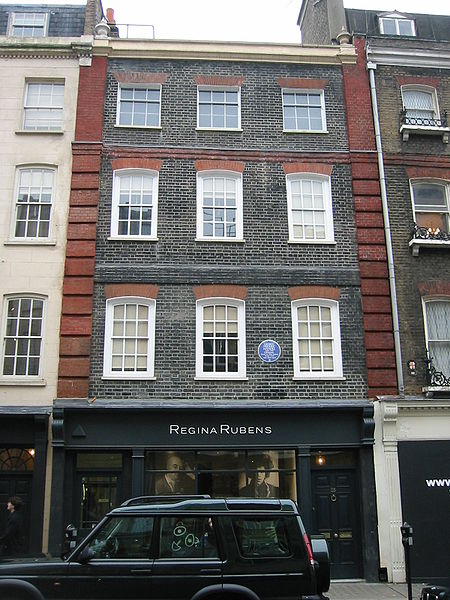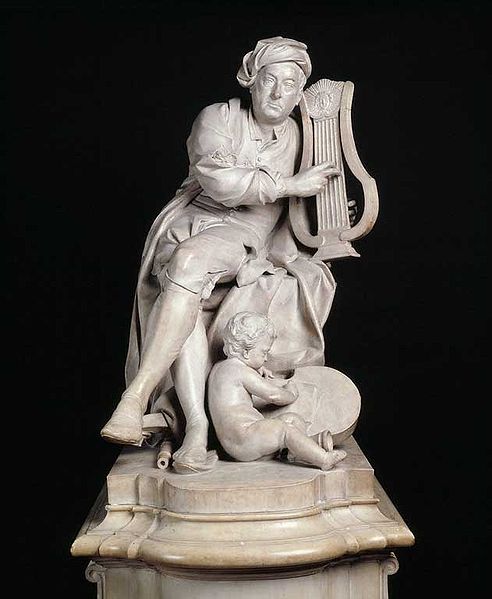<Back to Index>
- Mathematician Jean-Baptiste Morin, 1583
- Composer Georg Friedrich Händel, 1685
- First President of the Republic of Estonia Konstantin Päts, 1874

George Frideric Handel (German: Georg Friedrich Händel) (23 February 1685 – 14 April 1759) was a German-English Baroque composer who is famous for his operas, oratorios, and concerti grossi. Handel was born in Germany in the same year as JS Bach and Domenico Scarlatti. He received critical musical training in Italy before settling in London and becoming a naturalised British subject. His works include Messiah, Water Music, and Music for the Royal Fireworks. He was strongly influenced by the techniques of the great composers of the Italian Baroque and the English composer Henry Purcell. Handel's music was well-known to many composers, including Haydn, Mozart, and Beethoven.
Handel was born in Halle (which was then in the Duchy of Magdeburg, a province of Brandenburg-Prussia) to Georg and Dorothea (née Taust) Händel in 1685. His father, Georg Händel, 63 when his son was born, was an eminent barber-surgeon who also served as surgeon to the court of Saxe-Weissenfels and the Margraviate of Brandenburg. Handel had discovered such a strong propensity
to Music, that his father who always intended him for the study of the
Civil Law, had reason to be alarmed. He strictly forbade him to meddle
with any musical instrument but Handel found means to get a little
clavichord privately conveyed to a room at the top of the house. To
this room he constantly stole when the family was asleep. At an early age Handel became a skillful performer on the harpsichord and pipe organ. One day Handel and his father went on a trip to Weissenfels to visit either his son (Handel's half-brother) Carl, or grandson (Handel's nephew) Georg Christian who was serving as a valet to Duke Johann Adolf I. According
to legend, the young Handel attracted the attention of the Duke with
his playing on the church organ. At his urging, Handel's father
permitted him to take lessons in musical composition and keyboard
technique from Friedrich Wilhelm Zachow, the organist of the Lutheran Marienkirche. From then on Handel learned about harmony and contemporary styles, analysed sheet music scores, learned to work fugue subjects and copy music. Sometimes he would take his teacher's place as organist for services. In 1698 Handel played for Frederick I of Prussia and met Giovanni Bononcini in Berlin; in 1701 Georg Philipp Telemann came to Halle to listen to the promising young man.
In 1702, following his father's wishes, Handel began the study of law at the University of Halle; and
also succeeded in getting an appointment as the organist at the local
protestant cathedral. After a year Handel seems to have been very
unsatisfied and in 1703, he moved to Hamburg, accepting a position as violinist and harpsichordist in the orchestra of the opera house. There, he met Johann Mattheson, Christoph Graupner and Reinhard Keiser. His first two operas, Almira and Nero, were produced in 1705. He produced two other early operas, Daphne and Florindo, in 1708.
In 1706 Handel travelled to Italy at the invitation of Gian Gastone de' Medici, whom Handel had met in 1703/1704 in Hamburg. There Handel met the librettist Antonio Salvi, with whom he would collaborate. According to rumors at the time, he also had a love affair with Vittoria Tarquini, a singer. Handel left for Rome and as opera was (temporarily) banned in the Papal States, composed sacred music for the Roman clergy; the famous Dixit Dominus (1707) is from this era. He also composed many cantatas in pastoral style for musical gatherings in the palace of Cardinals Pietro Ottoboni, Benedetto Pamphili and Carlo Colonna. Two oratorios, La Resurrezione and Il Trionfo del Tempo, were produced in a private setting for Ruspoli and Ottoboni in 1709 and 1710, respectively.Rodrigo, his first immature, but all-Italian opera, was produced in the Cocomero theatre in Florence in 1707. Agrippina was first produced in 1709 at Teatro San Giovanni Grisostomo, the prettiest theatre at Venice, owned by the Grimani's. The opera, with a libretto by cardinal Vincenzo Grimani,
ran for an unprecedented 27 performances. It showed remarkable maturity
and established Handel's reputation as a composer of opera. In 1710, Handel became Kapellmeister to George, Elector of Hanover, who would become King George I of Great Britain in 1714. He visited Anna Maria Luisa de' Medici and her husband in Düsseldorf on his way to London in 1710. With his opera Rinaldo, based on La Gerusalemme Liberata, Handel enjoyed great success. This work contains one of Handel's favourite arias, Cara sposa, amante cara. In 1712, Handel decided to settle permanently in England. He received a yearly income of £200 from Queen Anne after composing for her the Utrecht te Deum performed in 1713. One of his most important patrons was the young and wealthy Richard Boyle, 3rd Earl of Burlington, who showed an early love of his music. For him he wrote Amadigi di Gaula, an unusual opera, featuring Nicolo Grimaldi and no voices lower than alto. In July of 1717 Handel's Water Music was performed more than three times on the Thames for the King and his guests, such as Anne Vaughan, the Duchess of Bolton, Countess Godolphin, Countess of Darlington and the Earl of Orkney. The barges, heading for Chelsea or Lambethand
leaving the party after midnight, used the tides of the river. The
composition was successful in reconciling the king and Handel. In May 1719 Handel was ordered by Lord Chamberlain Thomas Holles, the Duke of Newcastle to look for new singers. Handel travelled to Dresden to attend the newly built opera. He saw Teofane by Antonio Lotti, and engaged the cast on account of the Royal Academy of Music. Handel may have invited John Smith, his fellow student in Halle, and his son Johann Christoph Schmidt, to become his secretary and amanuensis. In or even before 1723, he moved into a Georgian house at 25 Brook Street, which he rented for the rest of his life. This house, where he rehearsed, copied music and sold tickets, is now the Handel House Museum. In 1724 and 1725 Handel wrote several outstanding and successful operas, Giulio Cesare, Tamerlano and Rodelinda, with many of the da capo arias that made him famous, such as Svegliatevi nel core in a typical mood. After composing Silete venti, he concentrated on opera and stopped writing cantantas. Scipio, from which we have the regimental slow march of the British Grenadier Guards was performed as a stopgap. In 1727 Handel was commissioned to write four anthems for the coronation ceremony of King George II. One of these, Zadok the Priest, has been played at every British coronation ceremony since. In 1728 John Gay's The Beggar's Opera premiered at Lincoln's Inn Fields Theatre and
ran for 62 consecutive performances, the longest run in theatre history
up to that time. After nine years Handel's contract was ended by the
directors but he soon started a new company. In 1729 Handel became joint manager of the King's Theatre with John James Heidegger.
Handel travelled to Italy to engage seven new singers. He composed
seven more operas, but the public did not come to listen to his music
but to hear the singers. Handel reworked his Acis and Galathea which then became his most succesfull work ever. In the long run Handel failed to compete with the Opera of the Nobility, engaging musicians such as Johann Adolf Hasse, Nicolo Porpora and the famous castrato Farinelli. The strong support by Frederick, Prince of Wales caused conflicts in the royal family. In March 1734 Handel directed a wedding anthem This is the day which the Lord hath made, and a serenata Parnasso in Festa for Anne of Hanover. In 1733 the Earl of Essex received
a letter with the following sentence: "Handel became so arbitrary a
prince, that the Town murmurs". The board of chief investors expected
Handel to retire when his contract ended, but Handel immediately looked
for another theatre. In cooperation with John Rich he started his third company at Covent Garden Theatre. Rich was renowed for his spectacular productions: he suggested Handel use his small chorus and introduce the dancing of Marie Sallé, for whom Handel composed Terpsichore. In 1735 he introduced organ concertos between the acts. For the first time Handel allowed Gioacchino Conti, who had no time to learn his part, to substitute arias. Financially, Ariodante was a failure, although he introduced ballet suites at the end of each act. Alcina, his last opera with a magic content, and Alexander’s Feast or the Power of Music based on John Dryden's Alexander's Feast starred Anna Maria Strada del Pò and John Beard (tenor). In
April 1737, at age 52, Handel suffered a stroke which left his right
arm temporarily paralysed, preventing him from performing. He also complained of difficulties in focussing his eyesight. In
summer the disorder seemed at times to affect his understanding. Nobody
expected that Handel would ever be able to perform again. But whether
the affliction was rheumatism, a stroke or a nervous breakdown, he
recovered remarkably quickly. To aid his recovery, Handel had travelled to Aachen, a spa in Germany. During six weeks he took long hot baths, and ending up playing the organ for a surprised audience. Deidamia his last, and only baroque opera without an accompagnato, was performed three times. Having lost a fortune in operatic management, Handel gave up the business in 1741. In the meantime Handel enjoyed more and more success with his English oratorios, and John Walsh published six organ concertos, and twelve Concerti grossi. Following his recovery Handel focused on composing oratorios instead of opera. His Messiah was first performed at the New Music Hall in Fishamble Street, Dublin, on 13 April 1742, with 26 boys and five men from the combined choirs of St Patrick's and Christ Church cathedrals participating. In 1749 he composed Music for the Royal Fireworks; 12,000 people attended the performance. In 1750 Handel arranged a performance of Messiah to benefit the Foundling Hospital.
The performance was considered a great success and was followed by
annual concerts that continued throughout his life. In recognition of
his patronage, Handel was made a governor of the Hospital the day after
his initial concert. He bequeathed a copy of Messiah to the institution upon his death. His involvement with the Foundling Hospital is today commemorated with a permanent exhibition in London's Foundling Museum, which also holds the Gerald Coke Handel Collection.
In addition to the Foundling Hospital, Handel also gave to a charity
that helped to assist impoverished musicians and their families. Also,
during the summer of 1741, the Duke of Devonshire invited Handel to
Dublin to give concerts for the benefit of local hospitals. In August 1750, on a journey back from Germany to London, Handel was seriously injured in a carriage accident between The Hague and Haarlem in the Netherlands. In 1751 his eyesight started to fail in one eye. The cause was a cataract which was operated on by the great charlatan Chevalier Taylor. This led to uveitis and subsequent loss of vision. Jephtha was
first performed on 26 February 1752; even though it was his last
oratorio, it was no less a masterpiece than his earlier works. He died some eight years later in 1759 in London, at the age of 74, with his last attended performance being his own Messiah. More than three thousand mourners attended his funeral, which was given full state honours, and he was buried in Westminster Abbey.


